To celebrate his marriage, the students residing in the hostel of Osmania University gave a reception for Dr. Hakim (the gentlemen with garlands on the left)
If we were to describe Dr Khalifa Abdul Hakim in one word, we would say that he was a ‘sage’. He was a thinker, philosopher, and poet, who authored several books on Islam and literature. He also knew seven languages and translated books from English and German into Urdu. He was highly respected by brilliant minds of his time like the great poet-philosopher Allama Iqbal and Rabindranath Tagore, the Bengali poet and mystic and the Nobel Laureate for Literature.
Dr Hakim (Khalifa Sahib) was the product of an era during which there was an awakening amongst the Muslims of the Subcontinent. Born in 1896, he lost his father at an early age but was guided by a sagacious mother who recognised his talents and encouraged him to pursue his ambitions. His education began in Lahore from where he went to MAO College, Aligarh, and finally completed his Bachelors’ from St Stephen’s College, Delhi. He then enrolled in its Department of Philosophy for a Masters’ degree and secured record-breaking marks.
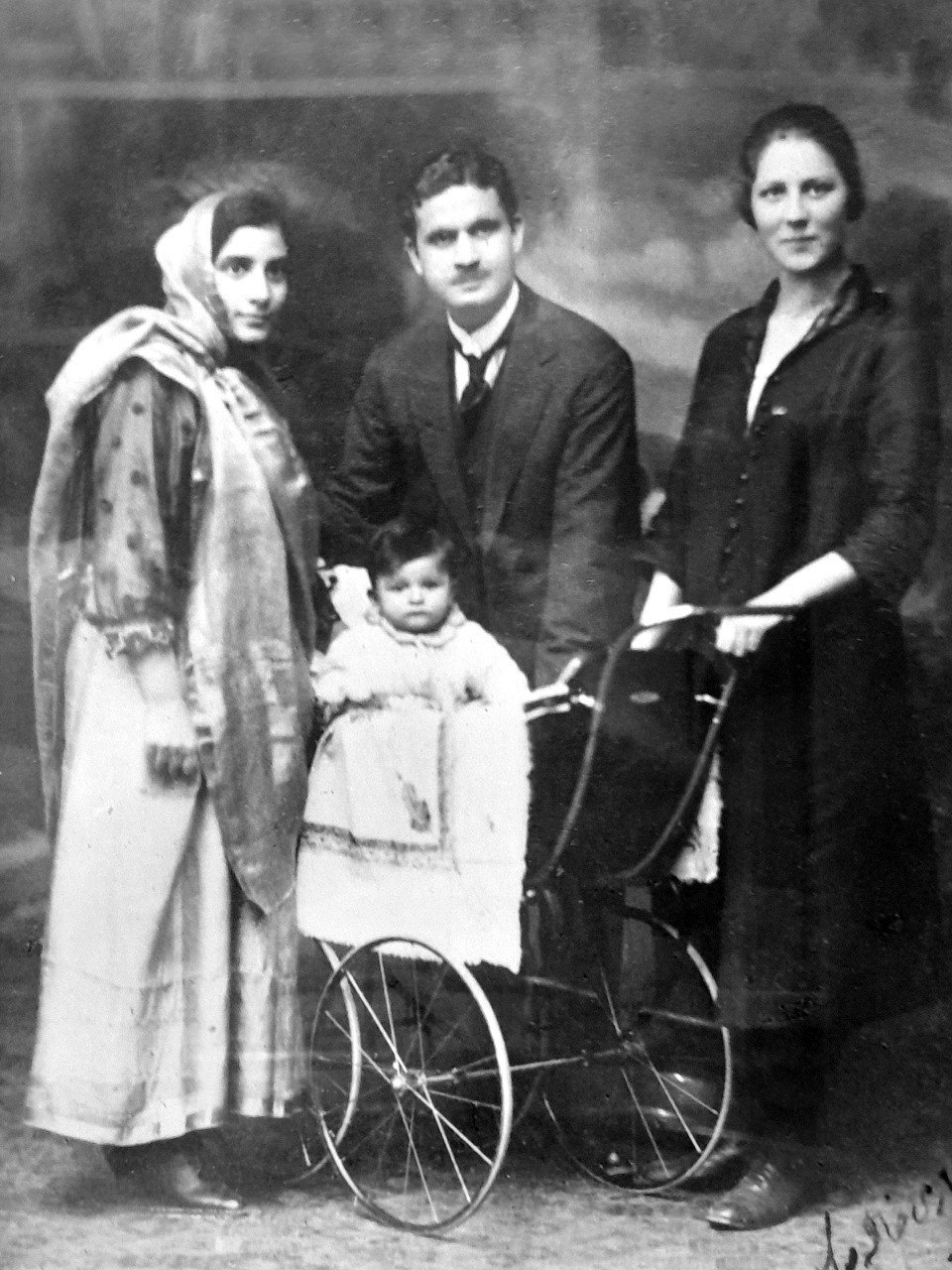
Dr Hakim in Heidelberg 1923 flanked by his wife Khadija, the German nanny Monica and infant son Arif Hakim
Iqbal and Khalifa Sahib shared Kashmiri ancestry and a close relationship. Though there was an age difference of nearly 20 years, there was a great deal of respect of each other’s capabilities and commonality in their thoughts on religion, Eastern and Western philosophy, literature and poetry. When Nizam Osman Ali Khan established the Osmania University in Hyderabad in 1918, Dr Iqbal declined the offer to head its Department of Philosophy but recommended Khalifa sahib. He wrote to the Nizam, “Khalifa Abdul Hakim, too, is Iqbal in his own way.” Khalifa Sahib was only 22 years old when he became a founding professor in the department.
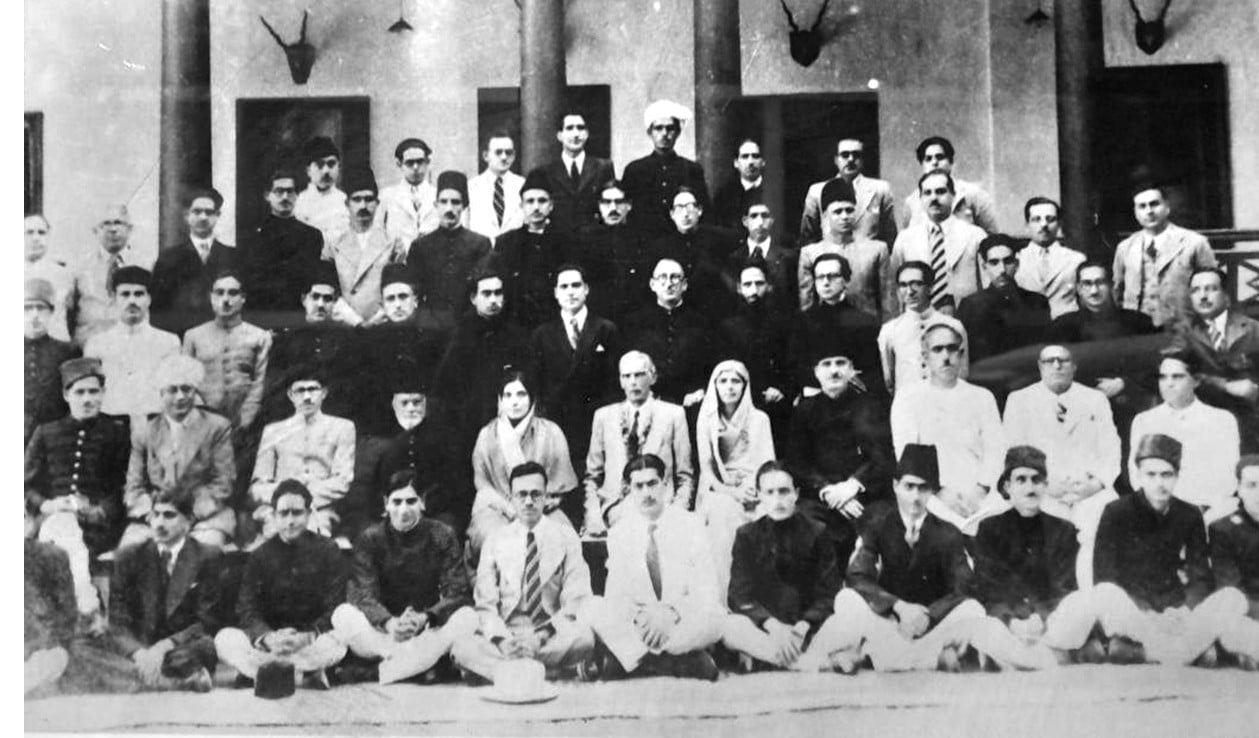
The Quaid e Azam Muhammad Ali Jinnah with students and dignitaries at the Amar Singh Club, Srinagar in 1946. On his left is Begum Khadija Hakim, and on his right Mohtarma Fatima Jinnah, Dr. Hakim, and Shaikh Abdullah the first Prime Minister of Indian administered Kashmir
In 1922, Khalifa Sahib left for Europe with his small family on a scholarship provided by the Nizam. He first learnt German and then became a research scholar at the universities of Freiberg, Heidelberg, Sorbonne (Paris) and Cambridge. In 1925 he was awarded a Doctorate in Philosophy from Heidelberg University. Coincidently, 20 years earlier Dr Allama Iqbal also spent time at Heidelberg studying Philosophy and Literature as well as German and was so fond of the city that he wrote the poem "Ek śhām Nekar ke kināre" (An Evening on the bank of the Neckar). Interestingly, both did their doctorates in philosophy on similar thesis: Iqbal on The Development of Metaphysics in Persia", and Khalifa Sahib on the Metaphysics of Rumi. Allama Iqbal considered Jalal ud Din Rumi (1207-73), as his murshid or spiritual teacher.
Khalifa Sahib then returned to Osmania University and at the age of 29 was appointed as the Head of the Department of Philosophy. Osmania was the seventh university to be established in India and was the first with Urdu as the medium of instruction, which the Nizam considered "the language of the widest currency in India.” To enable his students to study philosophy in Urdu, Khalifa Sahib translated two English texts: Weber’s History of Philosophy, (Tareekh e Falsifa e Hayat), and Varieties of Religious Experiences by William James (Nafsiyat o Vardat e Ruhani). He also translated two texts from German: Outline of Greek Philosophy by Eduard Zeller (Mukhtasir Tareekh Falsafa e Yunan), and History of Modern Philosophy by Harold Foffding (Tareekh Falsifa e Jadeed). Khalifa Sahib also contributed several articles to the university magazine, delivered public lectures, and presided over literary functions and Mushairas (poetry recitals). Krishen Parshad, the prime minister of the state, who patronised the arts, appreciated the role of Khalifa Sahib. Mrs Sarojini Naidu, one of India's feminist luminaries, was another of his admirers.
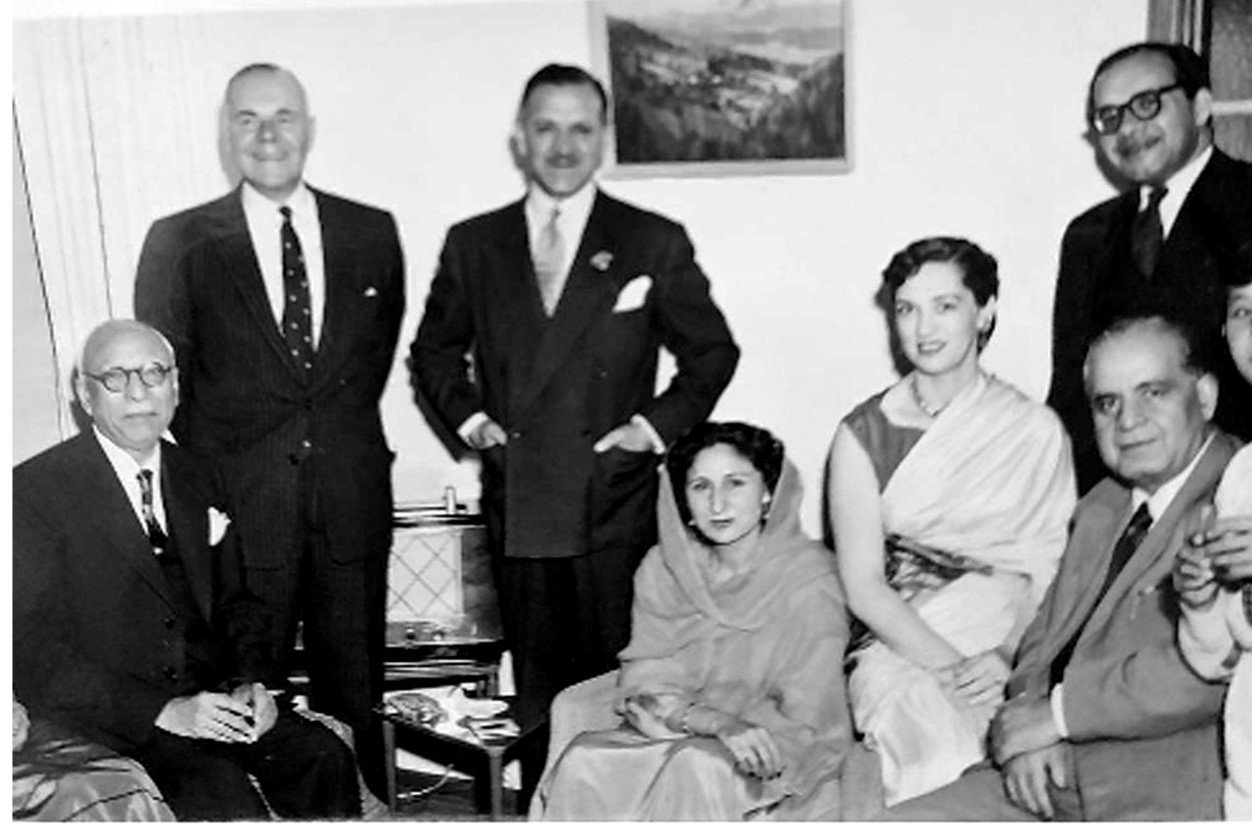
In 1957 Dr Hakim attended the UNESCO sponsored East West Philosophers’ Conference in Canberra to improve the understanding of the cultures of East and West. Dinner at the Pakistan High Commission. L-R Professor Sharif, J Oldham, former High Commissioner for Australia in Pakistan, Lt Gen Muhammad Yousuf, High Commissioner for Pakistan, Begum Yousuf, Begum Jafri, Fareed Jafri, Press Attaché, Dr Hakim
Rabindranath Tagore had established an open-air college at Shantiniketan in West Bengal, which became the Visva-Bharati University after Independence. The same year that Dr Hakim returned from Heidelberg, he was asked by Tagore to request the Nizam to establish an Islamic Centre at Shantineketan. He also offered Dr Khalifa to be the first to occupy the Chair of Islamic Studies. Dr Hakim arranged a grant from Hyderabad State but declined the offer of the Chair as he wanted to serve the community on a large scale. Khalifa Sahib remained with Osmania University for nearly 20 years.
Khalifa Sahib wrote extensively on One World, One God, One Humanity. His role in promoting the universal values and message of progressive Islam, both nationally and internationally, was well received. He was a member of a number of international forums that promoted universal values. He was a sponsor of the Brotherhood Week, formed in 1930 to counter the anti-immigrant and anti-religious narrative across different religions in the US. It was celebrated till the 1950s and the interfaith engagement based on cross-country tours became very popular. Amongst others in this fraternity were M Raziuddin Siddiqui the nuclear physicist, G D Birla the great industrialist, Prince Dhani of Thailand, Rajkumari Amrit Kaur and Sir Abdur Rashid, a legal philosopher and the first chief justice of Pakistan. Its first Honorary Chairman was President Roosevelt, followed by Konrad Adeneur, Vijayalakshmi Pandit, and others.
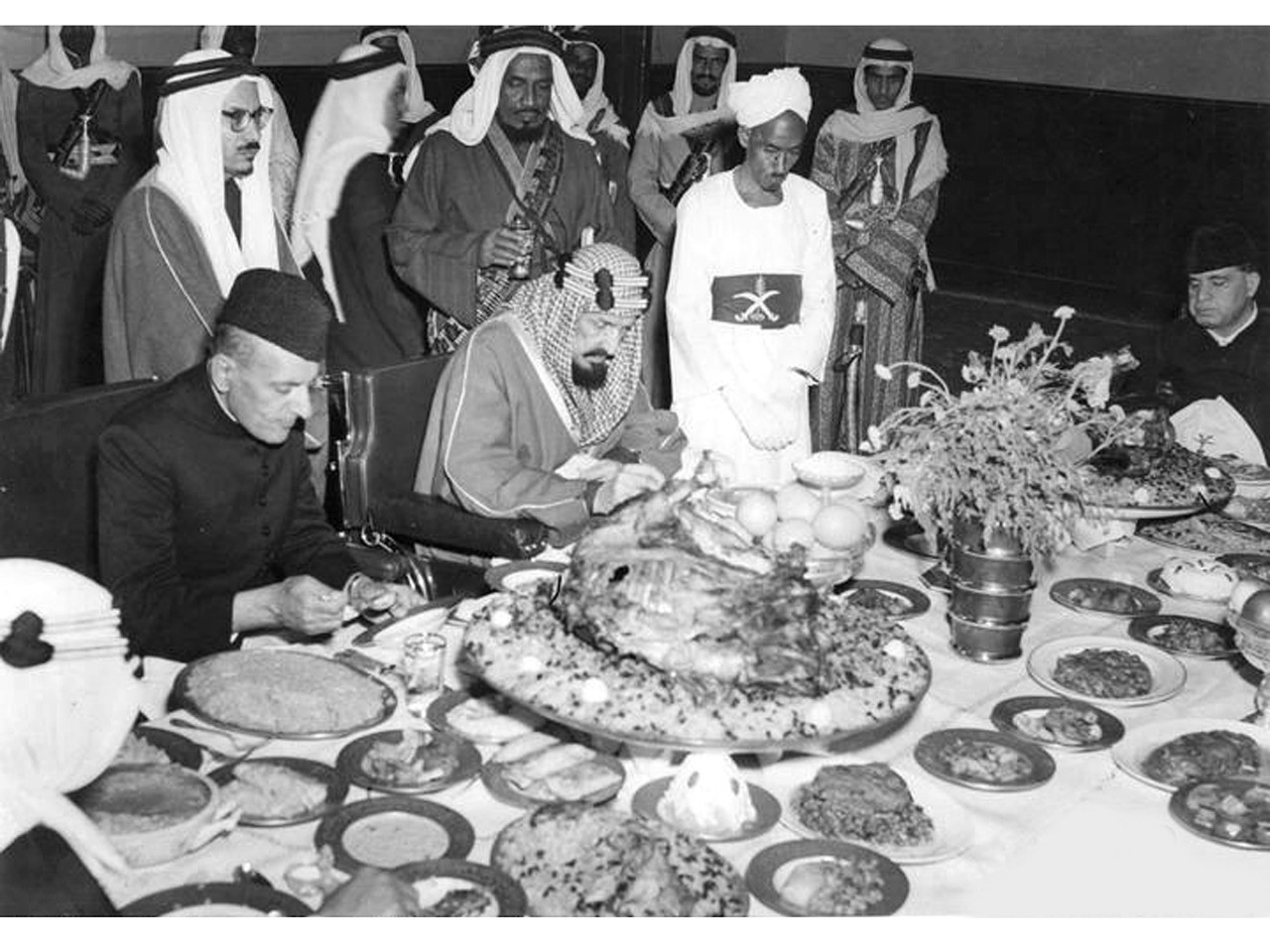
Dr. Hakim (right) at a banquet hosted by King Ibne Saud of Saudi Arabia where he was presented with a royal robe and sword in 1953. Seated on the left is Governor General of Pakistan Ghulam Muhammad, and standing behind in glasses is Muhammad Asad the Austro-Hungarian-born Jew who converted to Islam and translated the Quran into English
Dr Hakim was a member of various Commissions, to give practical shape to ideas reflecting liberal Islam. Khalifa Sahib represented the high ambitions of the sub-continent’s educated generations. These lectures were a reminder to the present generations who may have become unmindful of their collective past and set aside the intellectual perspectives of their forebears. He brought the Muslim psyche closer to the conditions of the modern world that belonged as much to progressive Islam.
In 1943 he went on a three-year deputation to the Amar Singh College at Srinagar. He was also appointed Director of Education of the State of Kashmir. Kashmir was very close to Khalifa Sahib’s heart. In June 1931, Abdul Qadeer, a Kashmiri activist was arrested and tried on charges of sedition after he made an impassioned speech against the Dogra rule to a politically charged crowd in Srinagar in June 1931. Following this event, Khalifa Sahib wrote a poem sitting beside the Dal lake in Srinagar with the title, Ai Khitta e Kashmir (O land of Kashmir). The poem captured the emotions of those struggling for freedom and is prophetic because he foresaw the struggle for freedom with the attendant sacrifices by the Kashmiris. He was highly regarded by most of the Kashmiri leaders and while posted at Srinagar, he was involved in negotiations.
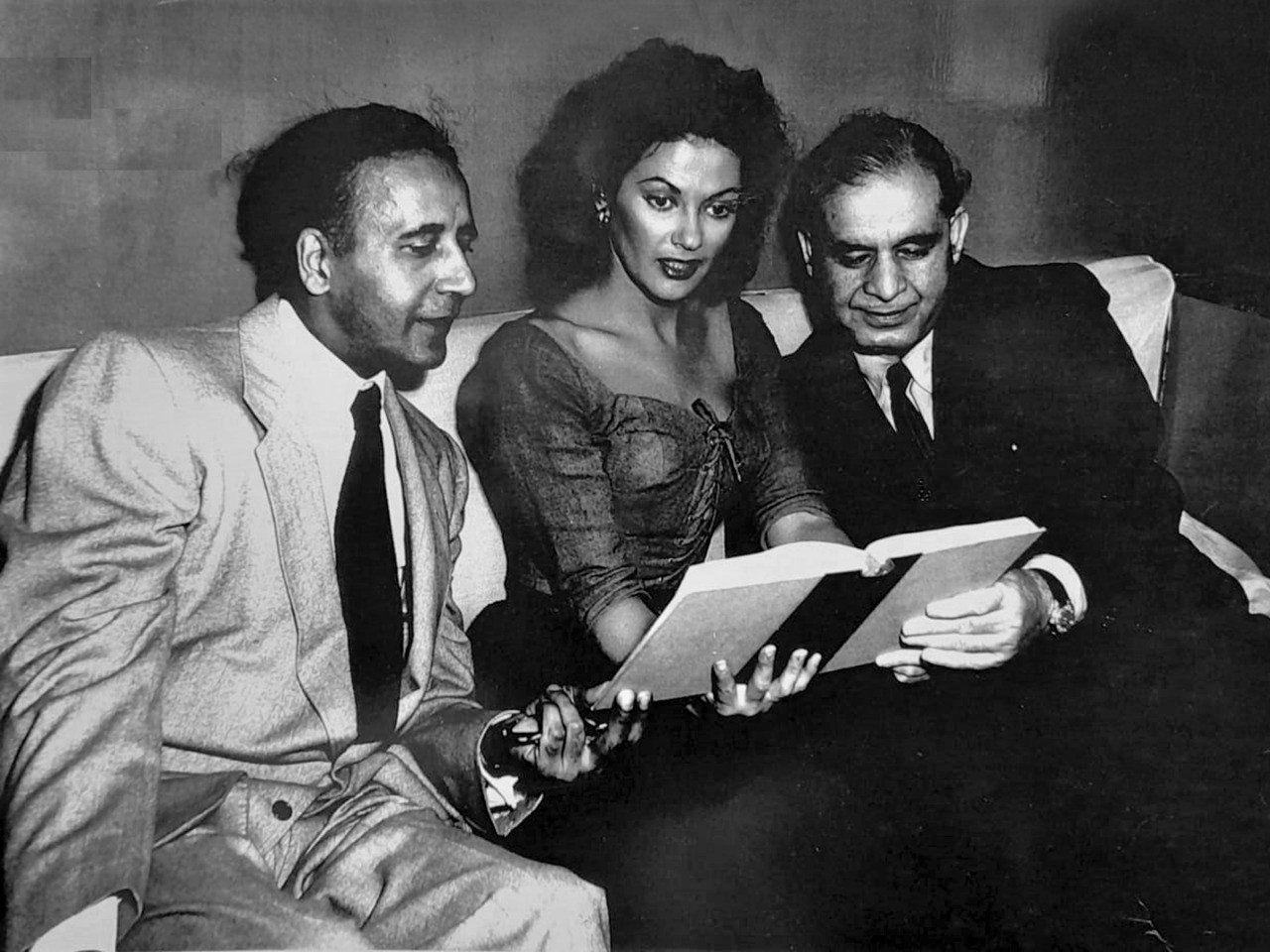
During a lecture tour in the United States in 1952, Dr. Hakim was given a tour of the Paramount Studios, Hollywood California by the famous actress Yvonne De Carlos (seated center). One of her most famous roles was as the wife of Prophet Moses in The Ten Commandments screened in 1956
Both the contending political figures in Kashmir i.e. Chaudhri Ghulam Abbas of the Muslim Conference and Shaikh Abdullah of the National Conference frequently visited his house in Srinagar. Khalifa Sahib made great efforts but was unable to draw the two closer and advised Shaikh Abdullah against launching the quit Kashmir movement in 1946. He correctly reasoned that since imperialism was coming to an end after the Second World War, such a hasty action was uncalled for. However, at the instigation of Nehru, Abdullah went ahead which led to mass agitation with 20 dead and 200 arrests. Nehru attempted to come to his rescue with a battery of lawyers but was stopped dramatically by the bayonets of the Maharaja’s soldiers at the Kohala bridge over the River Jhelum.
Just before Independence, Khalifa Sahib transferred all his assets from Hyderabad, Deccan to Srinagar but he was unsure that he had made the right decision. He had a strong spiritual connection with Hafiz Shirazi, the 14th century lyric poet from Persia whose monumental work Dewan-i-Hafiz is considered one of the seven literary wonders of the world by Goethe and Emerson. Khalifa Sahib used to consult Hafiz’s Dewan for a faal (foretelling of events, advice, etc.) and there were times when the exact words of his query would appear in the faal! When he consulted the Dewan in early 1948, he was advised to take off and throw away his pashmina shawl because the chinaar (sycamore) trees were to go up in flames. Both the pashmina wool and the chinaar are symbolic for Kashmir, the wool in particular. He, therefore, moved to Lahore, and soon after the Kashmir War of 1948-49 broke out.
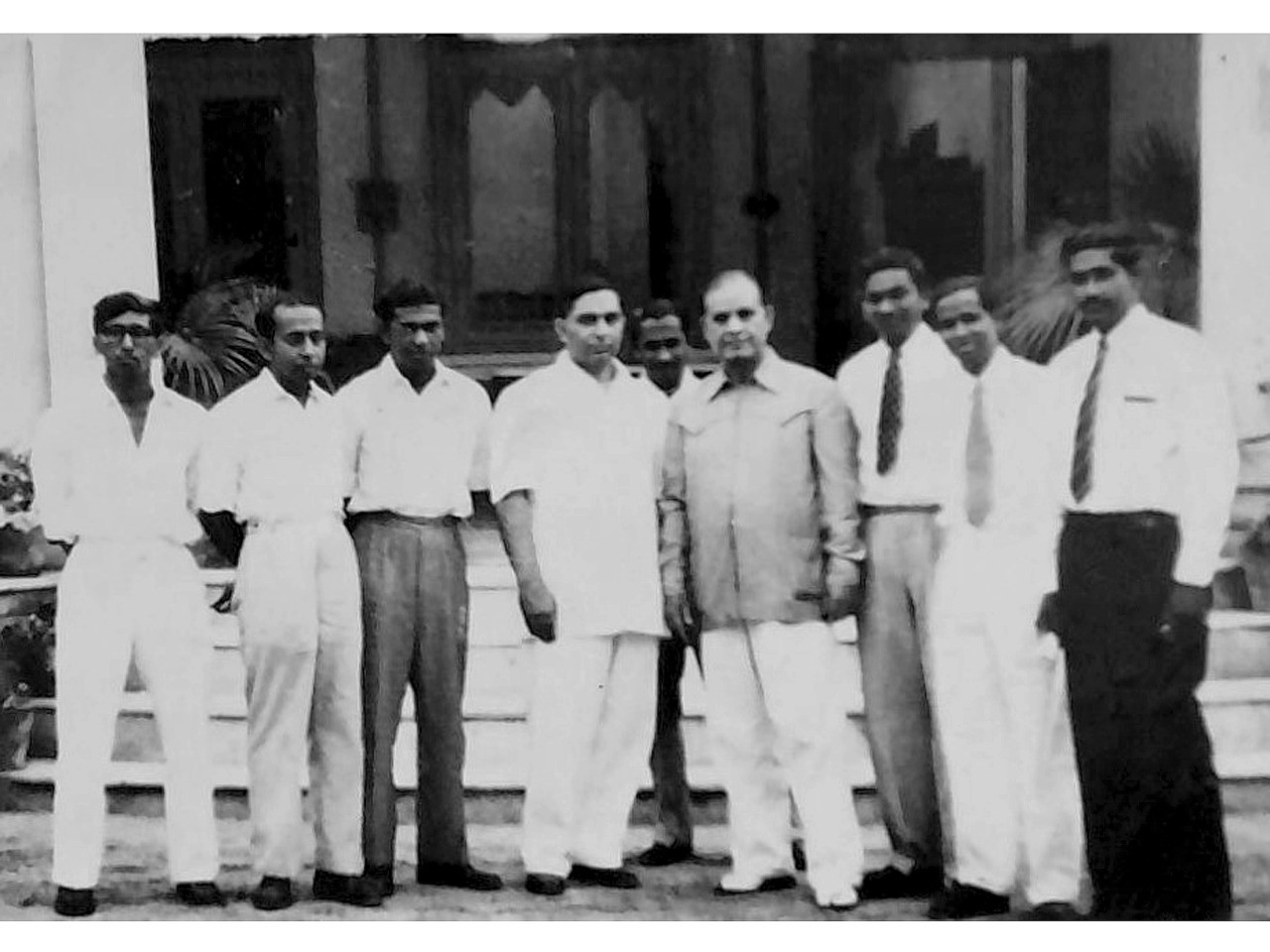
Dr. Hakim (fourth from right) at the Institute of Islamic Culture that he founded at 2 Club Road, Lahore
When he shifted back to his home city of Lahore in 1948, the Punjab University awarded him Honorary Legum Doctrin Award (LL.D); however, he declined the post of Vice Chancellor of Punjab University. He felt he could be of greater use in contributing towards the newly established State of Pakistan based on the vision of Iqbal and Mohammad Ali Jinnah’s efforts. His main interest was in the promotion of universal values in Islam in the contemporary context. These were reflected not only in his writings but also in establishing an Institute of Islamic Culture in Lahore. The institute, which still exists at 2 Club Road, published books on a variety of subjects that exemplified the progressive nature of Islam. He took great interest in this institute and remained its director till he passed away.
In 1953, the Institute published Khalifa Sahib’s book on Islam and Communism. In this well-acclaimed book, he observed that while purporting to address material aspects, the Russian Revolution was detrimental to the values of humanity. He wrote that the pendulum of human existence swung between Liberty and Order to hold a balance between the two. Unrestricted liberty would not create or consolidate any social or political structure; that a stream remained a stream only if it flowed between the banks. On the other hand, too much order of thought and in the private life of the individual curtailed elbowroom for freethinking, so deadening the human spirit. All totalitarianism stems from force and denial of personal freedom with differences resolved through force. He saw Islam as providing a just balance between order and liberty where exploitation, monarchies and feudalism would give way to a welfare state of one world and one humanity.
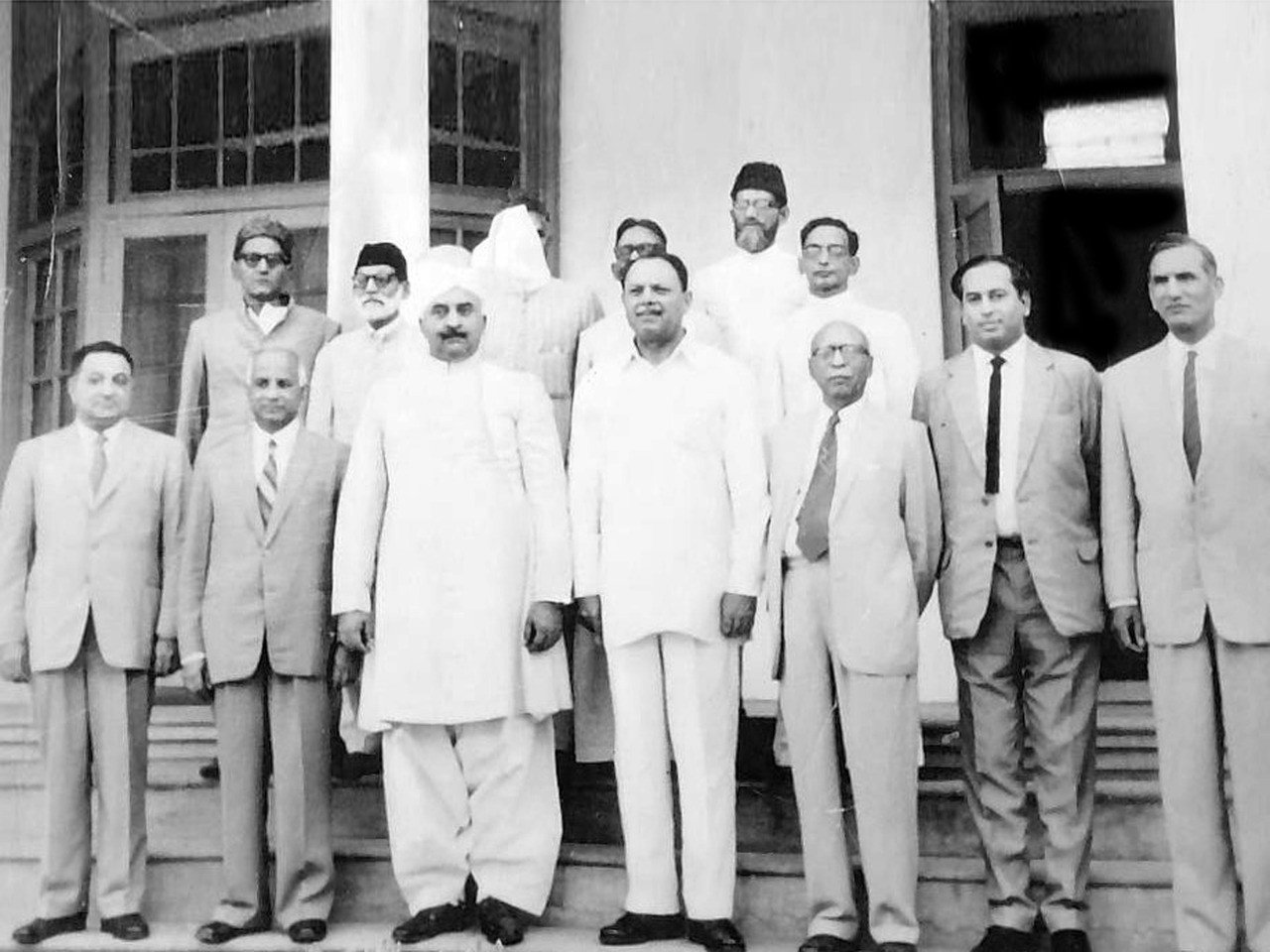
In 1962, President Ayub and Nawab of Kalabagh visited the Institute of Islamic Culture founded by Dr. Hakim in Lahore. In the works of Dr. Hakim, Zulfiqar Ali Bhutto (second from right) found what he was looking for: an author, a book, and a philosophy he could politically present as ‘Islamic Socialism’
Khalifa Sahib also presented papers at seminars of the Pakistani chapter of the Congress of Cultural Freedom, an international association formed in 1950 to counter communist influence. Worldwide it had over 100 distinguished thinkers, writers, artists, scientists and teachers from 21 countries. Khalifa Sahib’s focus was on Islam in the modern world and how to transmit its values to the younger generation; that Islam did not insist on belief in any dogma without evidence or against the dictates of reason, observation and experience. He believed that knowledge and love are the ultimate values in Islam, which together constitute the good life for all times and in other worlds.
In his doctoral thesis, the Metaphysics of Rumi from Heidelberg University, he explains Rumi as a source of inspiration across cultures; Rumi does not dissect reality piecemeal rather he enters the very heart of it and communicates the living experience through which he passes. Khalifa Sahib explains Rumi being an heir to an immense intellectual and spiritual wealth through Abraham, Moses, Jesus, Greek philosophy, Christian, Islamic and Persian influences. In his incisive book Islamic Ideology, Khalifa Sahib mentions that within the fold of Islam, all great prophets were monotheists and in the line of the religious development of the Israelites, the Qur’an makes a special reference to Abraham who presented monotheism in a clear and emphatic form that the Holy Prophet (peace be upon him) repeatedly asserted by saying that he trod the path of truth as treaded by Abraham who repudiated idol worship and the worship of natural phenomena as gods. In Hinduism too there was a long and gradual development from polytheism and nature worship to monotheism or spiritual monism, though a large body of Hindus could not step beyond incarnation. Buddhism was monotheistic in a mystic sense through an indescribable unity with their divinity. Christian belief was also Unitarian though the trinity doctrine did not subscribe to the monotheism of Christianity. Islam never claimed to be the first teacher of monotheism; it asserts this belief is as old as humanity preached by the great prophets and scriptures in a pure form. Islam believes in the unity of all religions being its essential tenet. From which follows the unity of humanity.
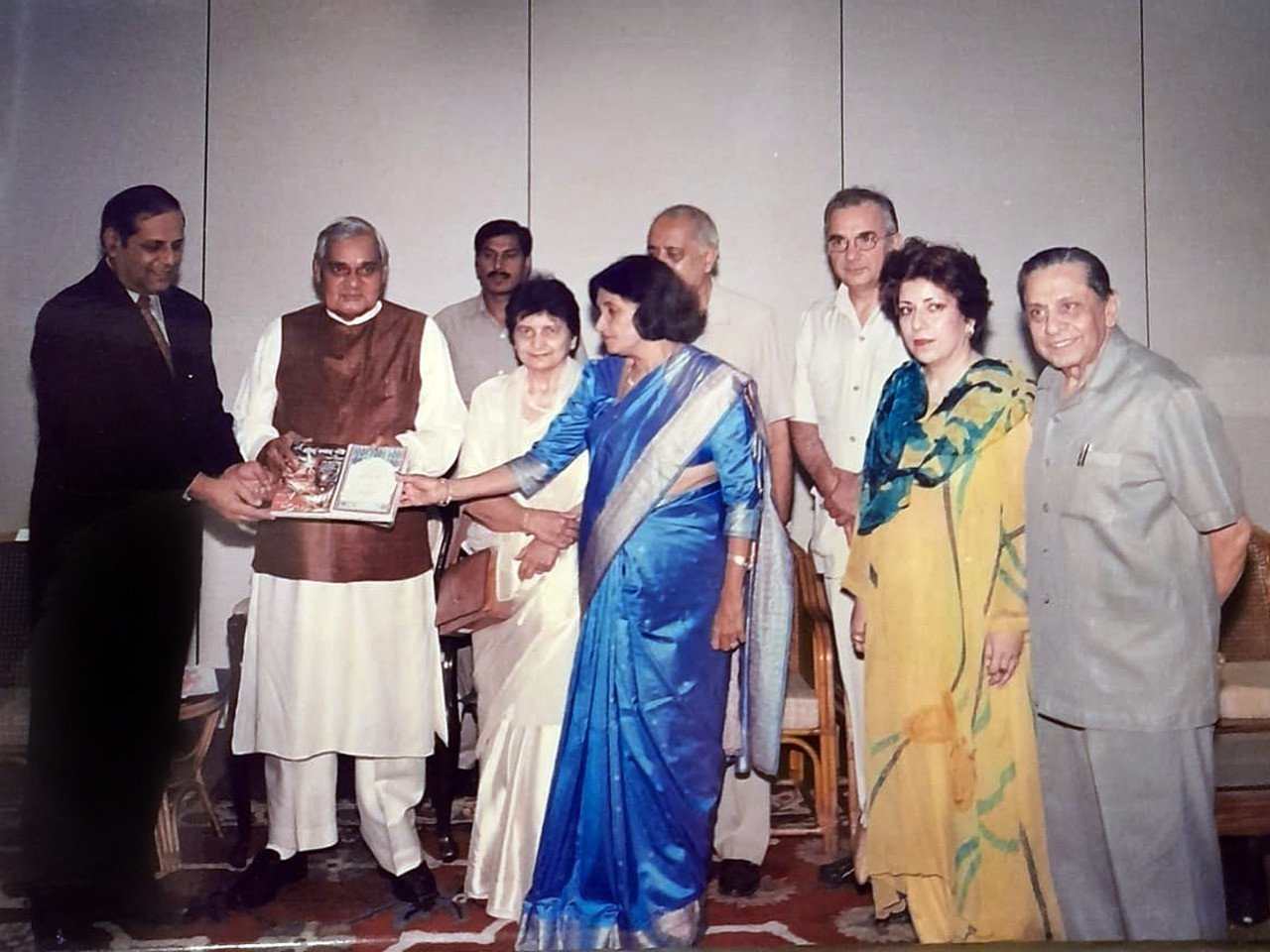
Dr. Hakim fulfilled Alama Iqbal’s express desire to translate the Bhagwat Gita into Urdu verse. The unpublished manuscript was picked up by Professor Khusro, the Vice-Chancellor of the Aligarh University during his visit to Pakistan and published by the industrialist Firodia. The relatives of Dr. Hakim were invited to the book launching in Delhi which was attended by the Prime Minister of India. Present in the picture L-R. Mr Firodia, PM Vajpayee, Dr. Rafia Hasan (daughter of Dr. Hakim), Mrs. Firodia, Professor Khusro, Pakistan’s High Commissioner Jahangir Qazi and Dr. Naveed Hasan co-author of this article
Khalifa Sahib too asserted that linguistic and other differences existed in the modes of life in different nations but all humanity was one and all nations should try to agree on fundamentals. This constituted the brotherhood of man. This brotherhood in early Islamic history allowed everyone to follow their own convictions provided the peaceful social order was kept intact. For example, the Holy Prophet (peace be upon him) issued invitations to the rulers of surrounding kingdoms not to accept Arab domination but to submit to the ideal which could unite diverse races and creed.
The last decade of Khalifa Sahib’s life was his most productive in promoting the universal values of Islam. Scholars including Khalifa Sahib published a large number of books with progressive approaches toward relevant issues based on the fundamentals of Islam in consonance with the changing contexts and needs of the time. The progressive spirit smothered by the self-styled orthodox clergy could be countered by free thinkers and reformists who could point the way towards achieving progress towards an egalitarian society.
To lead to a welfare state necessary legislation was required to ensure accountability at all levels of elected members and administrators. To this effect, Khalifa Sahib took an active part in commissions leading to such reform. His reformist approach to issues of religious education, governance, rule of law based on equity and protection of fundamental liberties was the progressive way forward. Khalifa Sahib’s monograph on Iqbal aur Mullah was once a text in the Urdu Department of Punjab University. It highlighted the differences in Iqbal’s faith and those of the reactionary clerics and was distributed by the military during the Ahmadi riots of 1953 in Lahore,
The archives of Khalifa Sahib show that scholars and leaders were constantly reaching out to him. The Aga Khan III who was one of the founders and the first permanent president of the All-India Muslim League shared Sir Syed Ahmad Khan's belief that Muslims should first build up their social capital through advanced education before engaging in politics. In 1950 he wrote two letters to Khalifa Sahib addressing him as one knowledgeable on Moslem and Eastern philosophy and proposed a meeting. In 1952, Filmer Northrop a Professor of Philosophy and Law at Yale University was delighted to have established contact with Khalifa Sahib and sought further enlightenment on his book entitled Islamic Ideology. In another letter in 1956 Dr Freeland Abbott of the Department of History at Tufts University, USA followed up on an earlier meeting to discuss theological transcendentalism comparing the Quranic story of Adam and Eve as close to Wren-Lewis’ interpretation of the Biblical story.
Ghulam Muhammad who was the Governor-General of Pakistan from 1951-55 greatly respected Khalifa Sahib who had been his classmate at the Sheranwala Gate School in the walled city of Lahore. Ghulam Muhammad was from the Audit and Accounts Service in British India and in 1942 was assigned as an advisor to the Nizam of Hyderabad. In 1951, Khalifa Sahib was invited by the University of Notre Dame in USA to address the 5th Convocation of Natural Law where he spoke on the ‘’The Natural Law in the Moslem Tradition’’. The Government of Pakistan arranged for Khalifa Sahib to remain in the US and embark on a lecture tour to present the progressive values of Islam that had universal appeal as One God, One World, One Humanity. The Journal of Pakistan Affairs compiled by the Ministry of Foreign Affairs reported that during the tour, he addressed audiences in 30 cities from the East Coast to the West and from Chicago down to Dallas. He also addressed audiences in cities, which were hotspots of the Civil Rights Movement like Atlanta, Georgia and Birmingham, Alabama.
He emphasised that religion is a comprehension of natural law and to be true to oneself and fellow beings one should follow the natural law and thereby be true to God. When a person turns to God sincerely, the disturbed equilibrium of life is restored and sin does not stick to his soul. He reiterated in Islam both males and females had fundamental human rights as well as civil rights and economic independence before other creeds or cultures had attempted it. Women’s right to inheritance, holding property in her name, choosing a marriage partner and divorce were all granted by Islam. His message was heard in Pakistan too and he was appointed the Secretary of the Commission on Muslim Family Laws of Pakistan, which legislated the Muslim Family Laws Ordinance of 1961 protecting women and family rights.
When Nawab Gurmani became Governor of West Pakistan in 1955, Khalifa Sahib was his literary speechwriter. He advised the Governor to establish a high-caliber translation bureau that would convert to Urdu books on all subjects as was practiced in Osmania University. In 1956, Khalifa Sahib was back in USA on an extensive lecture tour. The objective was to familiarise well-read audiences with the concepts of Islamic Ideology and Democracy. He also discussed topics related to Pakistan’s problems; its attitude towards Russia and America, and Islam and Communism, America’s support of Western Imperialism and Colonialism and its neglect of the Muslim world. The tour achieved a measure of success in familiarising the aims and ideals as well as the problems of Pakistan and removing misunderstandings related to Islam. Khalifa Sahib’s interactions with intelligentsia in inter-faith dialogues acted as a small bridge between East and West.
On his way back from the US, he addressed a Convention on Interfaith Dialogue organised in Lebanon by the Friends of the Middle East. He also contributed an article titled ‘How can Islam transmit its Values to the Younger Generation’’. He wanted a cultural renaissance where scientific and critical studies became a feature of the future. A year later he headed east to attend a UNESCO-sponsored conference in Canberra of East-West Philosophers whose purpose was to improve the understanding of the cultures of East and West.
Khalifa Sahib authored twelve books on various topics related to philosophy, Islamic Ideology, Jalal ud Din Rumi and Allama Iqbal’s thoughts. His book Afkar-e-Ghalib elaborates on the philosophical thoughts in Ghalib’s poetry. Khalifa Sahib himself had been writing verse since he was a student. According to some recognised poets of that period, he showed a lot of promise, however, it was only later in life that he occasionally wrote poetic works. However, a selection of his expresses a deep imprint of his philosophical bent of mind and tendency towards spirituality. Khalifa Sahib’s compendium of poems though in simple verse are profound and convey the universal truths of daily life, e.g. Hasrat e Benam (the desire that has no name), shows that man experiences pain, fame and toils to strive yet there is always an unfulfilled desire that has no name, and Gheree Kushhi Ghera Gham, (Immense joy and deep pain), shows that all emotions emanate from the heart and so are spiritual treasures. He also translated poems of Longfellow’s and wrote on the beauty of Kashmir, a subject close to his heart.
Radio was also one of the mediums through which Khalifa Sahib conveyed his message on the oneness of God. His talks broadcast by Radio Pakistan were on Iqbal’s concept of God, Insaan or What Constitutes a Man and on Communist Views on Religion that compared what Communism claimed to be with what their leaders actually practiced. In 1956, his talk on Islam was aired by the New Zealand Broadcasting Service, as part of their series on world religions and in January 1959, Radio Pakistan invited Khalifa Sahib for a talk on liberal thinking and intellectual freedom in the Holy Quran, for the Quaid e Azam Memorial Lectures. Sadly, this was not to be as he had a massive heart attack on January 30 while attending a conference in Karachi and breathed his last. He was survived by his wife Khadija, son Arif Hakim and daughter Dr Rafia Hasan who retired as Professor and Chairperson of the Institute of Applied Psychology, Punjab University, Lahore.
What was Khalifa Sahib as a man? He was a role model with complete faith that God would look after him in all circumstances. He believed in and tried to practice the true values and spirit of Islam – not just the rituals and developed a very balanced personality. He was seldom annoyed and treated the servants and the poor as equals. He cherished his relationship with family and friends, and had a pleasant nature with a sense of humor and wit which made everyone seek his company and remember him; Acquiring wealth was his least priority because he believed in higher values as worthy of pursuit. He never let material losses depress him in life as he looked at things philosophically and was optimistic and hopeful at all times.
Khalifa Sahib’s memory lives on in his ideas and writings. In 1975 Justice Rehman laid the foundation for an annual memorial lecture that has been delivered in his honor at Lahore and for the past five decades; eminent scholars have spoken on relevant subjects. In 2001 his daughter Dr Rafia Hasan and his granddaughter Dr Naveed Henderson were invited to Delhi for the book launch of a translation done by Khalifa Sahib of the Bhagavad Gita. This versified Urdu translation captured the spirit of the Gita like no previous normal translation and reflects Khalifa Sahib’s appreciation of the universal values expressed in other faiths. The book launch of his translation was done by an Indian educational trust and sponsored by a businessman from Pune. The chief guest was then Prime Minister of India Atal Behari Vajpayee.
Khalifa Sahib has left a treasure trove of his thoughts and ideas for posterity. All books, articles, poems and letters authored by him are available for free download on http://www.khalifaabdulhakim.com
Dr Naveed Hasan Henderson, business historian, is the granddaughter of Dr Khalifa Abdul Hakim and Founding Director of the Management Studies Department at Government College University Lahore and can be reached at naveedhasan@yahoo.com; Major General Syed Ali Hamid, military historian and author is the grandnephew of Dr Khalifa Abdul Hakim and can be reached at syedali4955@gmail.com. All information and facts provided are the sole responsibility of the writers.
